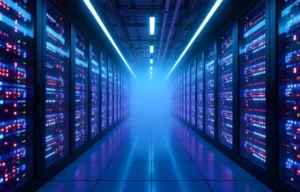

Prefer to listen instead? Here’s the podcast version of this article.
Artificial Intelligence (AI) is becoming an increasingly important tool in developing affordable, clean energy solutions with the world’s growing demand for energy and an equal desire to reduce its carbon footprint. AI technology can help reduce costs, improve efficiency, and optimize energy practices while producing clean energy. Let’s take a look at how AI is making this possible.
AI-Powered Efficiency
One way that AI is helping create more efficient energy production is by predicting when and where energy will be needed most. Using predictive analytics and machine learning algorithms, AI can analyze data from past trends to predict future energy needs. This allows companies to plan their energy production better to save resources on over-production while still meeting consumers’ demands.
Another way that AI can improve efficiency is by automating tasks that would otherwise require human labor. For instance, robots powered by AI technology can be used in oil rigs or other hazardous environments to monitor equipment or perform maintenance tasks without risking human lives. This type of automation increases productivity and reduces costs associated with labor expenses.
Optimizing Renewable Energy Sources
In addition to increasing efficiency, AI can optimize renewable energy sources such as solar, wind, hydroelectric, geothermal, and biomass. By using predictive analytics and machine learning algorithms, AI can identify patterns in weather conditions to predict when these renewable sources will be at their peak performance levels so they can be used most effectively. This helps ensure that the maximum amount of renewable energy is produced with minimal effort. This technology can also identify areas where additional renewable sources could be deployed to provide more sustainable power options for consumers.
The Benefits of AI for Affordable and Clean Energy
Artificial intelligence (AI) has immense potential to revolutionize the energy sector. It can help drive down costs, improve efficiency, and make sustainable energy sources more accessible and affordable. Below are a few benefits of leveraging AI for clean energy.
More Efficient Energy Production: One of the key benefits of AI for energy production is its ability to increase efficiency. By leveraging data from smart meters, weather forecasts, and grid congestion information, AI-based algorithms can generate more accurate predictions about a region’s future demand. This allows operators to anticipate better when they should start or stop generators from matching supply with demand—which helps ensure that electricity is generated efficiently.
Reduced Carbon Emissions: Another benefit of AI for energy production is its ability to reduce carbon emissions. By using predictive analytics to anticipate changes in supply and demand, operators can ensure that only enough electricity is generated to meet current needs—which reduces unnecessary production that leads to excess emissions. Furthermore, operators can reduce their reliance on fossil fuels and minimize their carbon footprint even further by predicting when renewable sources are most likely available or economical—such as when there’s plenty of sun or wind.
Cheaper Prices for Consumers: Finally, one of the significant benefits of AI for affordable and clean energy is its ability to help drive down prices for consumers through increased efficiency and better forecasting capabilities. As mentioned above, operators can use predictive analytics to anticipate changes in supply and demand more accurately, leading them to adjust their pricing strategies accordingly. In addition, by predicting when renewable sources are most likely available or economical, operators may also be able to offer cheaper rates during these periods so customers can save money on their electricity bills.
It’s clear that AI has the potential to revolutionize the way we produce affordable and clean energy. By utilizing predictive analytics and machine learning algorithms, companies can increase efficiency while optimizing their use of renewable sources such as solar or wind power. As a result of these advances in AI technology for clean energy production, consumers can enjoy lower costs and greater access to sustainable sources of power than ever before – all thanks to the power of artificial intelligence!
WEBINAR